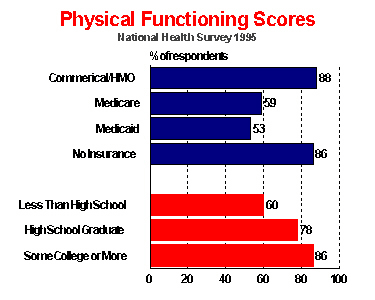
Excerpts
from The National Health Survey Report, page II-5
The
first measure of the index is the physical functioning
score. This score rates the respondents' ability to
perform physical activities without limitations due
to health problems. The higher the mean score on a
scale of one to one hundred, the better respondents'
overall physical functioning. The overall mean for
U.S. residents on this attribute was 80. As one might
expect, respondents' mean physical functioning score
decreased with age (18-34=92; 35-44=86; 45-64=79;
65+=60). U.S. residents' physical functioning score
also decreased with income level (above low income=85,
low income=72, poverty=62). In addition, respondents'
physical functioning score decreased with health status
(excellent=96, very good/good=86, fair/poor=38). (Chart
4) Respondents with Commercial/HMOs coverage and those
with no insurance had higher scores for this attribute
(88 and 86) than those with Medicare (59) or Medicaid
(53). U.S. residents with higher levels of education
had higher physical functioning scores than their
less educated counterparts (some college or more=86,
high school grad=78 vs. less than high school=60).
(Chart 5)
See
More Data?
National
Health Survey Intoduction Page
|